 2 citations,
January 1908 in “Journal of the American Medical Association”
2 citations,
January 1908 in “Journal of the American Medical Association” Fear of hair-related issues causes significant mental distress, especially in high-stress women.
 1 citations,
October 2023 in “International journal of Ayurveda and pharma research”
1 citations,
October 2023 in “International journal of Ayurveda and pharma research” Herbal medications might be safer and more effective for hair loss than synthetic treatments.
 1 citations,
July 2023 in “Advances in therapy”
1 citations,
July 2023 in “Advances in therapy” Hair transplantation is safe and effective for children with scar-related hair loss.
 1 citations,
January 2023 in “Przegląd Dermatologiczny”
1 citations,
January 2023 in “Przegląd Dermatologiczny” A man's severe skin reaction from cancer treatment improved with early diagnosis and proper medication.
 1 citations,
February 2022 in “Open Access Macedonian Journal of Medical Sciences”
1 citations,
February 2022 in “Open Access Macedonian Journal of Medical Sciences” Low zinc levels might contribute to early hair graying.

Adequate vitamin D might lower, and high hair chromium might increase DNA damage in obese women.
 1 citations,
April 2020 in “Journal of Cosmetic Dermatology”
1 citations,
April 2020 in “Journal of Cosmetic Dermatology” FUE megasession hair transplantation effectively treats large area hair loss with less discomfort and shorter operation time.
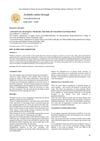 1 citations,
June 2019 in “Journal of Biological and Scientific Opinion”
1 citations,
June 2019 in “Journal of Biological and Scientific Opinion” PPD in mehendi can cause serious health problems and needs regulation.
 1 citations,
April 2019 in “Advances in Cosmetic Surgery”
1 citations,
April 2019 in “Advances in Cosmetic Surgery” Platelet-rich plasma shows potential for hair growth, but more research is needed to determine the best preparation method.
 1 citations,
May 2017 in “InTech eBooks”
1 citations,
May 2017 in “InTech eBooks” The document explains the causes, types, diagnosis, and treatments of hair loss, and its psychological impact, especially on women.
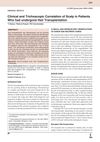 1 citations,
January 2017 in “International Journal of Dermoscopy”
1 citations,
January 2017 in “International Journal of Dermoscopy” A dermatoscope is important for evaluating hair transplants and managing patient expectations.
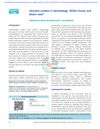 1 citations,
January 2014 in “Indian Journal of Dermatology, Venereology and Leprology”
1 citations,
January 2014 in “Indian Journal of Dermatology, Venereology and Leprology” The document concludes that clear communication and a strong doctor-patient relationship are essential for effective informed consent in dermatology.
 1 citations,
October 2013 in “Expert Review of Dermatology”
1 citations,
October 2013 in “Expert Review of Dermatology” Diagnosing alopecia areata is challenging and requires careful examination and various tests to distinguish it from other hair loss types.
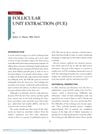 1 citations,
November 2009 in “Cambridge University Press eBooks”
1 citations,
November 2009 in “Cambridge University Press eBooks” FUE is a less invasive hair restoration method with potential to become standard, offering benefits like reduced scarring and pain, but requires experience to minimize risks.
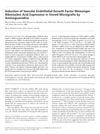 1 citations,
November 2005 in “Dermatologic Surgery”
1 citations,
November 2005 in “Dermatologic Surgery” Aminoguanidine increases VEGF in stored hair micrografts, potentially improving their viability after transplant.
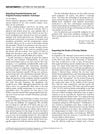 1 citations,
December 1999 in “Dermatologic Surgery”
1 citations,
December 1999 in “Dermatologic Surgery” Propofol-ketamine and propofol-fentanyl are effective and safe for cosmetic surgery sedation.
 1 citations,
May 1999 in “Journal of The European Academy of Dermatology and Venereology”
1 citations,
May 1999 in “Journal of The European Academy of Dermatology and Venereology” Treat hair loss with medicine, continue indefinitely.
 1 citations,
March 1985 in “Head & neck surgery”
1 citations,
March 1985 in “Head & neck surgery” Hair-bearing punch grafting effectively repaired damage from artificial hair implants.
 1 citations,
May 1965 in “Medical Clinics of North America”
1 citations,
May 1965 in “Medical Clinics of North America” Hair growth dysfunction involves various conditions with limited treatment options.
 1 citations,
March 1954 in “Archives of dermatology”
1 citations,
March 1954 in “Archives of dermatology” Animal research has greatly advanced dermatology.
 October 2024 in “Journal of Education Health and Sport”
October 2024 in “Journal of Education Health and Sport” Alopecia areata treatment should be personalized, using topical or systemic therapies based on severity, with promising options like JAK inhibitors needing more research.

COVID-19 can cause significant hair loss.
 July 2024 in “Journal of Dermatology Research Reviews & Reports”
July 2024 in “Journal of Dermatology Research Reviews & Reports” Stem cell therapy shows promise for treating hair loss by promoting hair growth.
 July 2024 in “Deleted Journal”
July 2024 in “Deleted Journal” The Ayurvedic program effectively manages hair loss due to iron deficiency anemia.
 June 2024 in “Дерматовенерология Косметология”
June 2024 in “Дерматовенерология Косметология” Autologous follicular stem cells improved hair loss in 57% of patients.
 April 2024 in “International Journal of Research Publication and Reviews”
April 2024 in “International Journal of Research Publication and Reviews” Alopecia areata causes hair loss with varied treatment responses and frequent relapses.

Premature graying of hair is linked to vitamin D and B12 deficiencies, thyroid issues, iron imbalance, stress, and lifestyle habits, and affects quality of life.
 February 2024 in “Journal of ayurveda and integrated medical sciences”
February 2024 in “Journal of ayurveda and integrated medical sciences” Ayurvedic treatments helped a 16-year-old regrow hair after modern medicine failed.
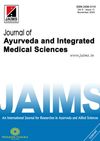 December 2023 in “Journal of ayurveda and integrated medical sciences”
December 2023 in “Journal of ayurveda and integrated medical sciences” Ayurvedic treatment significantly improved hair loss in a 17-year-old male.
 December 2023 in “Dermatology and therapy”
December 2023 in “Dermatology and therapy” Japanese patients and physicians often disagree on the severity of Alopecia Areata and treatment satisfaction, needing better communication and treatments.






























